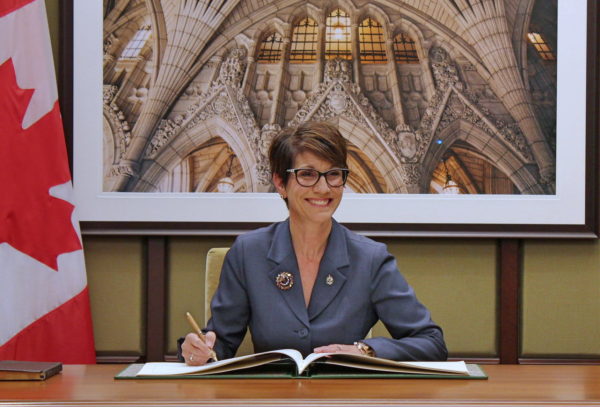 Conservative MP Kelly Block (Carlton Trail – Eagle Creek) tabled a private member’s bill to protect the conscience rights of medical professionals, Bill C-268: An Act to amend the Criminal Code (intimidation of health care professionals).
Conservative MP Kelly Block (Carlton Trail – Eagle Creek) tabled a private member’s bill to protect the conscience rights of medical professionals, Bill C-268: An Act to amend the Criminal Code (intimidation of health care professionals).
She explained, “Freedom of Conscience is one of the first fundamental rights laid out in the Charter of Rights and Freedoms and it is at the core of our Canadian identity.” The Saskatchewan MP continued, “This private member’s bill is a response to calls from physicians and patients to ensure conscience rights for medical professionals.”
In March 2020, the Physicians’ Alliance against Euthanasia said it had received reports that physicians unwilling to participate in euthanasia killings were being pressured and bullied to participate in so-called Medical Assistance in Dying (MAiD). The Alliance stated: “The reports we are hearing from distressed physicians describe deliberate disruption of arrangements that were previously working satisfactorily and that had permitted patients to have access to MAiD while still allowing for conscience objectors to not be involved in facilitating the patient’s death.” It continued: “This bullying and betrayal of collegial relationships can poison practice environments and compromise patient care. Such behaviour should not be tolerated by health care administrators in Canada.” It stated that “the pressure has been intense for many physicians, especially amongst palliative specialists.”
Alex Schadenberg, executive director of the Euthanasia Prevention Coalition, welcomed Block’s bill. “Conscience rights are essential,” he told The Interim. “Medical professionals who oppose MAiD are being coerced and intimidated into participating in euthanasia.” His organization launched a petition in support of C-268.
Block’s private member’s bill would make reprisals against doctors with conscientious objections to euthanasia or assisted-suicide a crime.
C-268 amends Section 241 of the Criminal Code, so “Every person who, for the purpose of compelling a medical practitioner, nurse practitioner, pharmacist or other health care professional to take part, directly or indirectly, in the provision of medical assistance in dying, uses violence or threats of violence, coercion or any other form of intimidation, is guilty of (a) n indictable offence and liable to imprisonment for a term of
not more than five years; or (b) n offence punishable on summary conviction.” It would also prohibit the firing or refusal to hire medical professionals if the sole reason is their refusal to take part in medical assistance in dying.
Block said in a press release, “Medical associations, medical professional groups, and other concerned organizations across Canada have called for conscience protection for medical professions including the Ontario Medical Association and First Nation leaders.” The issue was raised repeatedly by medical professionals speaking against the government’s euthanasia bill, C-7.
Block’s press release quoted Dr. Ellen Warner a professor of medicine at the University of Toronto and a staff medical oncologist at the Odette Cancer Centre at Sunnybrook, who said, “In the absence of conscience protection, the group with the most to lose are the patients — the people we are all trying to help,” explaining, “If all physicians who treat incurable diseases must promote medical assistance in dying, then there will no longer be such a thing as a second opinion.”
Block said, “This Bill protects the doctor-patient relationship by ensuring doctors and other medical professionals are always able to recommend and provide the care they believe is best for their patient.” She said, “Every patient deserves a second opinion. Conscience protections ensure that second opinions are always an option.”
In 2019, another Conservative MP David Anderson, now retired, introduced a conscience rights bill, Bill C-418, that was never voted on.




